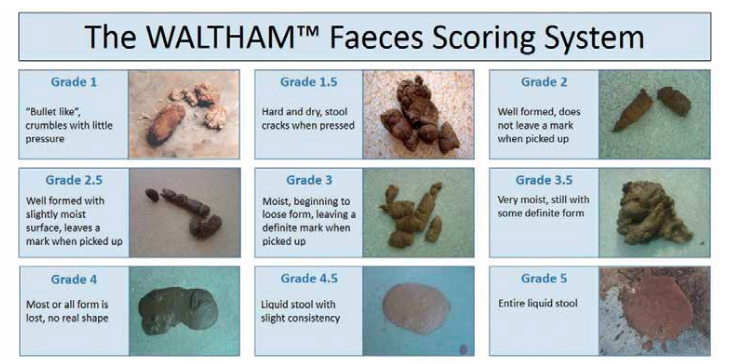Formulators understand that any kind of stress, including feed transition, weakens the immune system and can disrupt the dog’s digestive balance. Faecal consistency is regarded as a key indicator of digestive health. If a negative change including diarrhea is observed in the faeces, the pet owner may stop feeding the new pet food. The stakes are high for both the pet food company and the pet owner to ensure a successful feed transition.
During feed transition, new potential irritants and allergens may be introduced. This can alert the immune system and irritate the gut causing change in faecal consistency. This is why fortifying both the gut barrier and gut immunity through the pet food can improve the ease of transition and reduce the impact of feed stress. Massey University New Zealand are renowned for their canine health research facility which is designed to measure new kibble formulation benefits.
Olmix, a French seaweed company have developed a patented marine sulphated polysaccharide combination of two specific seaweeds. Multiple clinical trials show immune modulation, improved gut integrity and immunity across all animal species. These polysaccharides are a blend of Ulva (green seaweed) which directly modulates the immune system and Solieria (red seaweed) which tightens the cells of the intestinal wall and helps produce a healthy mucous barrier. The feed supplement, available as Algimun® PET, is added to pet foods at a rate of 3 kgs per ton.
The seaweed product, Algimun® PET has been privately trialled by leading Australian Petfood Brands who validated the positive results for gut health and improved feed transition. Following the trials, they included the feed supplement into their formulations.
An independent dog study conducted by Professor David Thomas and his team at Massey University has further confirmed
that standard kibble supplemented with Olmix seaweed polysaccharides improves faecal consistency and has a positive effect on palatability for healthy adult dogs.
Here is a quick summary of the trial design: The study went for 6 weeks and included multiple transition periods (stress), the first when the dogs were introduced to the new diet and when each group changed over to the control or test diet at week 3. Each dog’s faeces were monitored throughout the crossover trial to establish the impact of Algimun® PET on their digestive system.

Key Dog Digestive Health Trial results
- Continuous improvement of
faeces consistency – The Algimun® PET diet showed a constant improvement in faeces consistency using the Waltham scale.
- Enhanced Palatability – with preference for the diet with Algimun® PET, food consumption was 100%
- The inclusion of Algimun® PET to a standard kibble diet for dogs trended to optimally reduce the faecal scores of the dogs (P=0.0518). After 3 weeks of feeding, the faecal scores of the dogs on the test diet were almost half a grade (0.34) lower than the same dogs on the control diet. (See Figure 1).
- There were no exceptions to the improved faecal trend.
- There were no adverse cases.
Conclusion
The Massey University study validates a solution for petfood companies to improve the quality and acceptance of complete feeds resulting in consumer loyalty. Algimun® PET is supporting gut health and immunity for dogs. Its use provides a valuable solution for Pet food manufacturers looking to improve gut function in their formulations.
Please contact the authors for a copy of the official University trial report.












